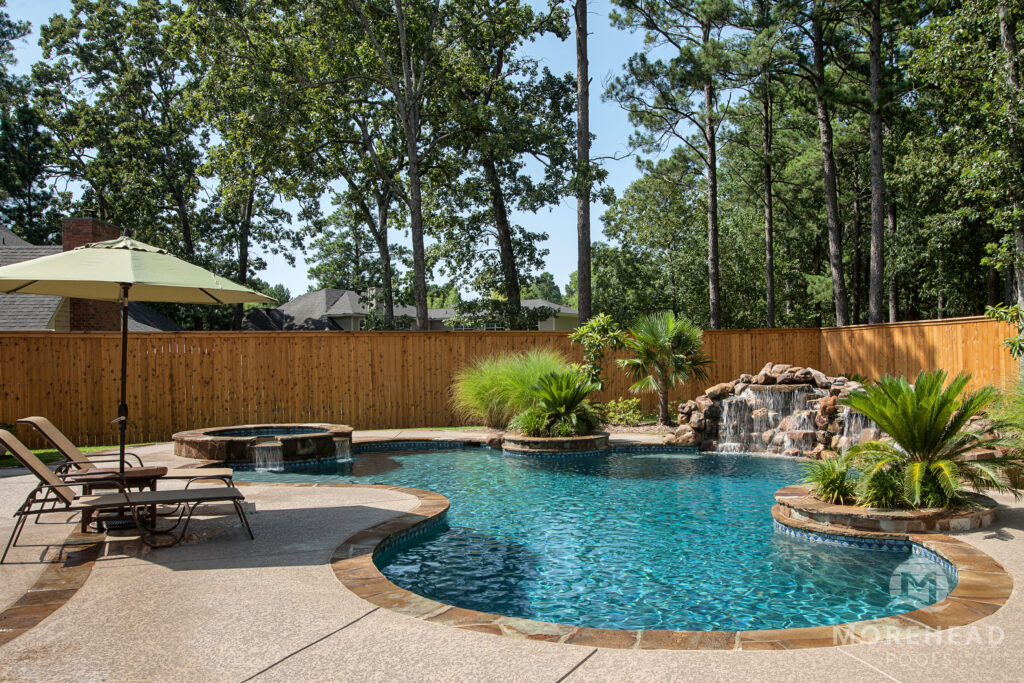
What Is a Gunite Swimming Pool?
If you’re doing your research into a swimming pool for your backyard, you may have already come across the term “gunite” a few times already. And while it’s probably easy to ignore as you do some casual reading, when it comes to taking the next step it’s best to be armed with as much information as possible to make an informed decision.
That’s why this month, at Morehead Pools we’ll be talking you through what gunite is, how it’s used, what relationship it has with shotcrete, and, ultimately, what the benefits of a gunite pool are.
Let’s get started with a breakdown of what the material is first of all.

What is gunite?
When you break it down to its core elements, gunite is simply a mixture of sand, cement, and water that is combined via the hose. These three key components form gunite, with the dry mixture fed through a hose system controlling how much or how little water is added before being sprayed into place.
When this gunite concrete mixture sets – called curing in the industry – it creates a thick, solid structure for the project it’s applied to.
Gunite has long been a common material used in swimming pool construction, and that’s what we’re going to take a look at in more detail next.
How is gunite used in pool construction?
Gunite is the substance that will make up the shape of your pool. To create this, the construction process using gunite goes a little bit like this:
- The area in which you want your pool to be is excavated
- Any plumbing requirements are put into place
- Engineered steel rebar is put into place where the gunite shell will be formed
- The dry materials for gunite are loaded into the equipment
- Using compressed air, the material is sent through a hose
- Water is added at the nozzle before it is sprayed into place
- The gunite shell then has to cure before plaster can be added
This is quite a simplified overview of how gunite is used, but it gives you an idea of the stages for the initial pool construction and how the shape of your pool is achieved. Gunite can also be used in resurfacing, concrete pool repair, or renovating a pool if required.
You can find out more about the pool building process on our dedicated construction process page.
How long does it take to build a gunite pool?
Before we start discussing how long a gunite pool takes to build, it’s important to note that the build time for any pool will depend on the size and complexity of the individual project.
That being said, you need to wait a certain amount of time for gunite to fully cure. This can usually be around 28 days before the next big step can be taken, but the shell should be ok to work around during that time if other steps need to be carried out. Overall, gunite swimming pools can take anywhere between six and eight weeks to complete from start to finish.
What is the difference between shotcrete and gunite?
There is actually very little to separate a shotcrete pool and a gunite pool. Shotcrete is a term you may also have come across regularly during any research into pool construction, and gunite is essentially just a form of shotcrete, with both materials sprayed into place using a hose.
The biggest difference between the two materials is that, whereas gunite is fed into the equipment dry and only mixes with water at the last second in the nozzle, shotcrete is already a wet mix. Shotcrete is pumped through a hose pre-mixed, meaning no additional water is added.
How to maintain a gunite pool
A gunite pool is a fantastic investment for your backyard, but keeping it in great shape requires regular care. Don’t worry – it’s not as complicated as it sounds! Here are some straightforward tips to help you maintain your gunite pool:
- Keep it clean – Brushing your pool walls and floor every week helps to prevent algae from forming and keeps the surface looking great. A pool vacuum or automated cleaner can make removing dirt and debris much easier.
- Check your water chemistry – Balancing your pool water is key to protecting the gunite surface. Make a habit of testing your pH, chlorine, and alkalinity levels weekly and adjust as needed to avoid scaling or damage.
- Inspect for small cracks – While gunite is extremely strong, it’s a good idea to keep an eye out for any small cracks that might appear over time. Catching these early will save you from bigger issues later.
- Maintain proper water levels – Keeping your pool’s water level in the recommended range ensures the shell doesn’t experience unnecessary stress.
- Schedule professional checkups – Having a professional technician inspect your pool every so often can identify potential problems and keep everything running smoothly.
- Plan for resurfacing – Over the years, the plaster finish on your gunite pool may start to wear. Resurfacing every 7–15 years will keep your pool looking and feeling brand-new.
By taking these simple steps, you’ll make sure your gunite pool stays a source of fun and relaxation for years to come. And if you ever need a helping hand, the team at Morehead Pools is here to provide expert advice and maintenance services.

Why choose a gunite pool?
By now, you probably feel like you have a better understanding of what gunite is, but may be wondering why you should choose a gunite pool for your backyard. Here are five benefits of gunite swimming pools:
- Customization – You can be flexible on everything from shape to added extras when you choose a gunite pool.
- Strength – Because a shotcrete or gunite pool shell is sprayed as one continuous shape, you get no joints or cracks, giving you a stronger pool to stand the test of time.
- Simplicity – Compared to other pool building methods, pools built with gunite are a lot easier and the construction team can control the mix more closely to deal with any potential issues.
- Depth – You can achieve greater pool depths with gunite than with other pool forms since the strength of the shell can withstand the external pressure from the earth surrounding it.
- Cost-effective – All the previous points in this list add up to make gunite a more cost-effective result for many pool builds where the only alternative is reinforced concrete.
If you’re researching the best materials for pool building and would like to know more, don’t hesitate to contact our team here at Morehead Pools. We’re leading pool builders for Bossier City and Shreveport, and we’re also Master Pools Guild members, which means you can count on our expertise for concrete pool ideas. We always begin by finding out your goals and arranging a design appointment to take care of all the details.
So what are you waiting for? Book an appointment with our team today for expert pool building and maintenance services.
